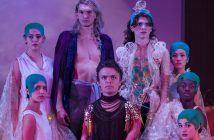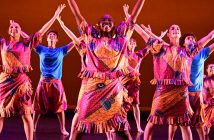
David Roskies, Myla Goldberg, Joshua Halberstam and Anne Hoffman Photo by Leo Sorel
How to faithfully chronicle the experience of growing up Jewish was the subject of a panel on Dec. 6 at the Lincoln Center campus.
“Growing Up Chosen: Jewish Writers and Their Childhood,” which was sponsored by the Center for Religion and Culture, featured:
• Joshua Halberstam, who read a selection from A Seat at the Table: A Novel of Forbidden Choices (Sourcebooks Landmark, 2009);
• Myla Goldberg, who read from her book Bee Season (Anchor, 2001); and
• David Roskies, who read and sang songs he learned from his mother in Yiddishlands: A Memoir (Wayne State University Press, 2008).
Moderator Anne Hoffman, Ph.D., professor of English at Fordham, noted in her introduction that storytelling is an important way for faith communities to understand of their place in the world.
The panelists’ backgrounds showcased the diversity of Judaism. Halberstam reflected on growing up in the deeply religious Chasidic community of Borough Park, Brooklyn, while Roskies spoke Yiddish with his mother in Montreal.
The entry from Bee Season that Goldberg read featured an account of her playing a game called Sheep during Friday night Sabbath services.
Goldberg said she was surprised that she was identified as a Jewish writer when the book was published.
“For the past 10 years, I’ve been thinking long and hard about what the effect of growing up Jewish and considering myself Jewish has on my writing. My second book doesn’t have a single Jew in it, and my third book does have one, but what does that mean? If a Jew writes a book with no Jews in it, is it still a Jewish book?” Goldberg wondered.
She concluded that although she doesn’t embrace the religious aspects of Judaism, her childhood instilled in her a strong sense of cultural, philosophical and historical identity.
“Certain themes keep popping up, and mostly for me, it’s the theme of ‘Tikkun olam,’ which translates into ‘the fixing of the world,’” she said. “There’s the idea that we as Jews have a duty to make the world a better place, because what we’ve inherited is broken. In every single one of my books, that pops up.”
For Halberstam, religion was front and center. His novel deals with questions of faith and belonging as the central character wrestles with whether to leave the insular world of his childhood.
Because his father hosted a popular Yiddish radio show that could be heard throughout his entire neighborhood, he grew up literally hearing stories about the Chasidic culture all around him.
“In Chasidism, telling stories is akin to prayer,” he said. “I grew up in this world where it was OK to tell stories. In fact, it was almost a requirement of growing up.”
When it came to the question of growing up as one of the “the chosen,” the three had very different perspectives.
“It’s very hard to convey this to people, but I actually believed that I had the truth. Not one of the truths. I grew up with the truth; 99.9999 percent of people had it wrong. I had a truth line that went straight from my father to his father to his father, all the way to Moses, and anybody who deviated was wrong,” Halberstam said.
“That’s incredibly empowering, and incredibly nuts, but it is what you grow up with. This, despite the fact that what we were also chosen for was for Auschwitz. So there was a real cognitive dissonance. That feeling was very strange as a child.”
Goldberg flat out rejected the notion, saying it conflicted with her humanist beliefs.
“For one group to decide that they are the chosen, the first thing that comes to my mind is superiority, or exclusion, and that just goes against my base humanist instincts that everyone has something chosen about them,” she said.
“Also, as a writer of fiction, the most important thing you can do is to spread empathy, and if you’re saying you’re the chosen, that automatically is a barrier.”
Roskies joked that he had no problem with the term. His mother, he noted, used to say to him, ‘You are God’s gift to me,’ because she was 42 when he was born.
“Obviously that’s a burden, because most of the time you don’t feel worthy. You feel like you’re faking it, like you’re bluffing. In what sense are you God’s gift to anybody? However, it stays with you, and you have to struggle with that,” he said.
It also didn’t help that Avrom Reyzen, one of the founders of Yiddish literature, came to visit the literary salons that Roskies’ mother held at their house when he was a child.
“Avrom Reyzen goes back to New York, and he gives a speech to the Workman’s Circle, and he says, ‘There is still a hope for Yiddish culture, because there are little Yiddish-speaking boys like David Roskies in Montreal.’ This is reported back to me by my mother,” he said.
He took this to heart, and at age 16, he started the Yiddish Youth Movement. At the group’s inaugural meeting in Manhattan, Max Weinreich, the éminence grise of Yiddish scholarship, introduced himself to Roskies.
“He said to me, ‘The field of Jewish studies needs you,’” he said. “I was 16 years old. I was dreaming of a career as a filmmaker. I had all kinds of utopian plans. But Max Weinreich recruited me for the field of Yiddish, which didn’t even exist. So that’s why I’m here. I was chosen.”


